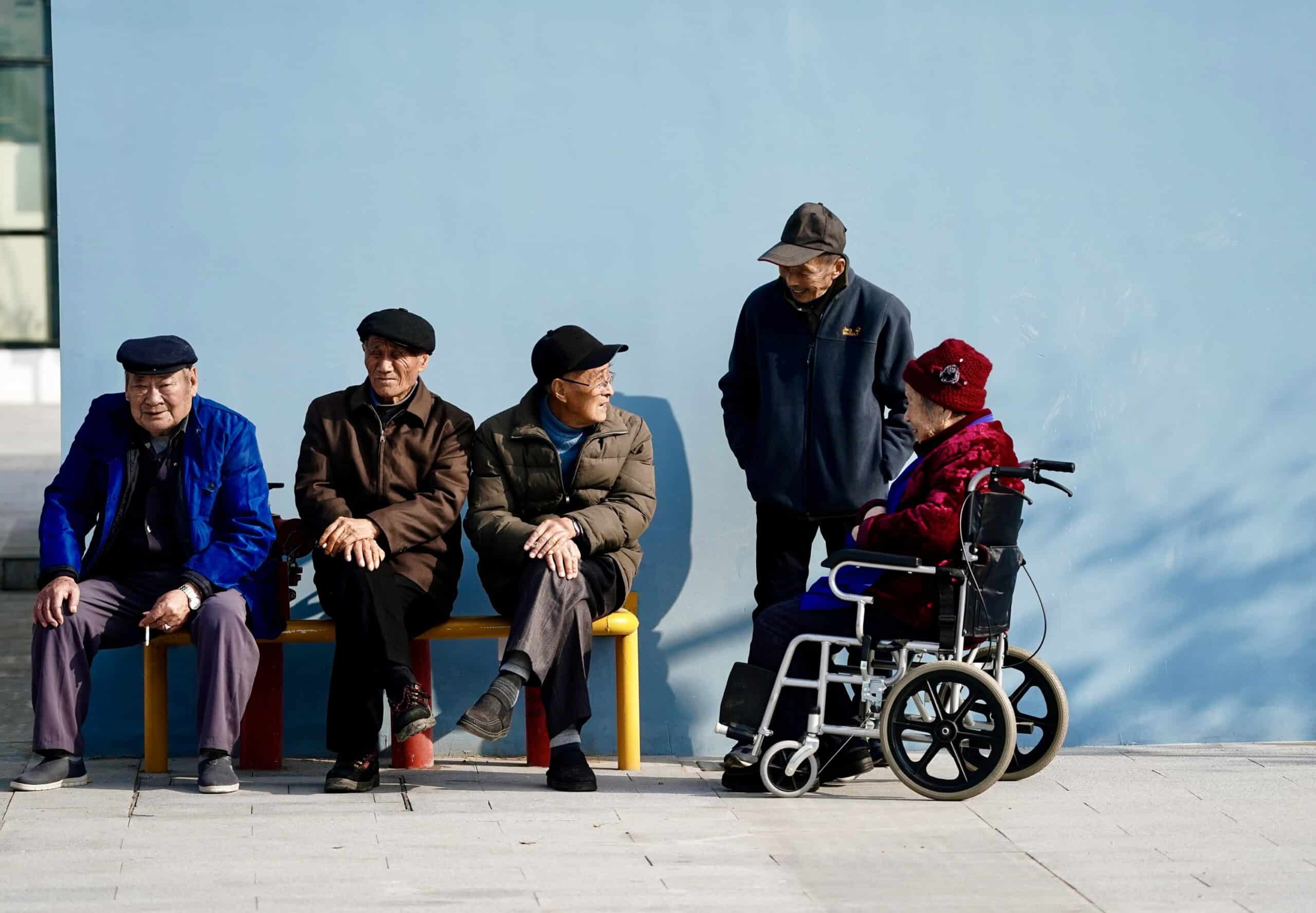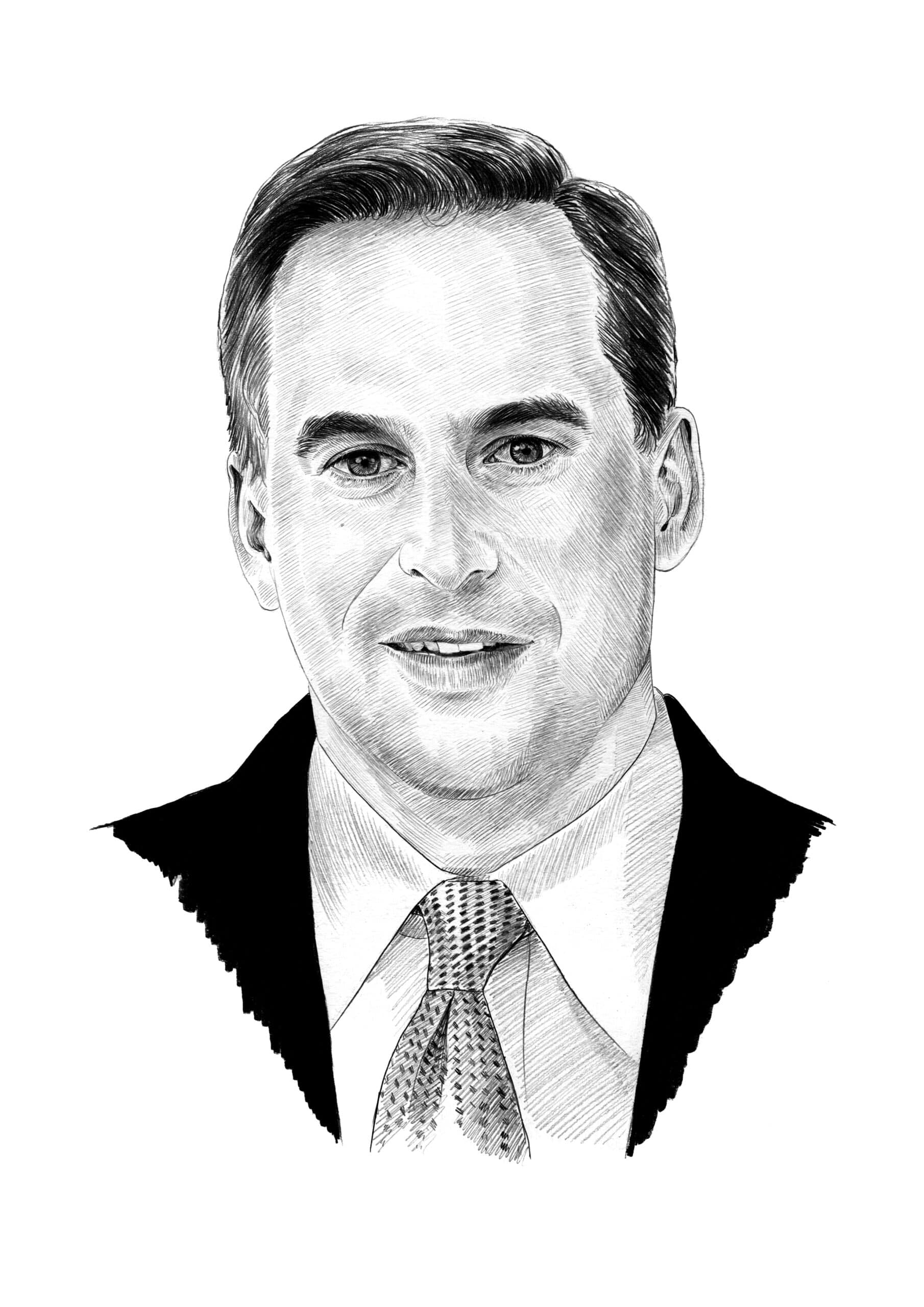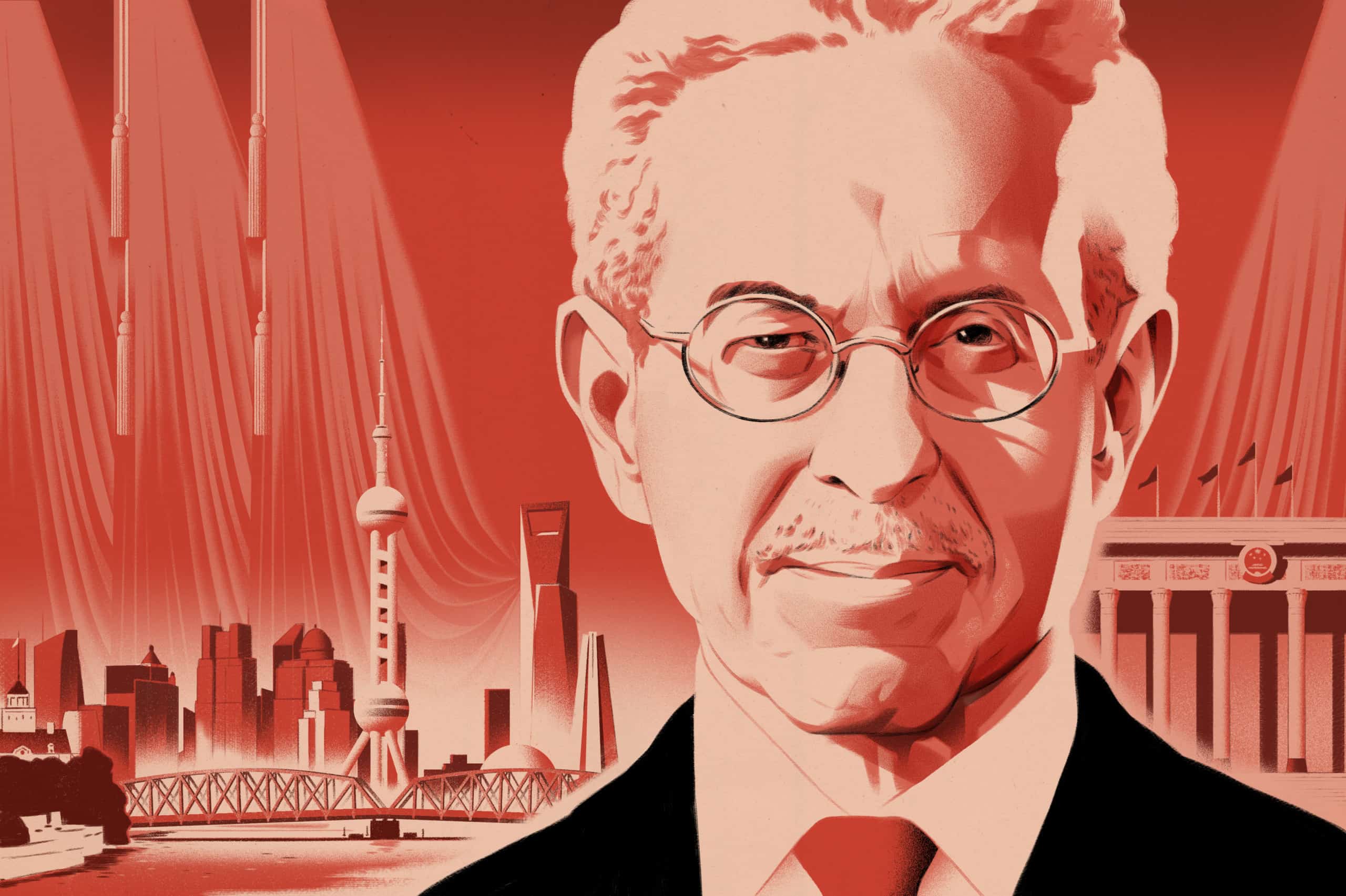
This past May, as Southern Californians entered their third month in quarantine from Covid-19, the local affiliate of PBS premiered a new documentary about poverty in China. Promising “unprecedented access,” the hour-long film followed Robert Lawrence Kuhn, a brain scientist and investment banker-turned-documentarian, as he traveled around China’s impoverished countryside. In his trademark mock turtlenecks, Kuhn interviewed villagers and officials about Beijing’s anti-poverty program — a massive effort that intends to lift 100 million people out of abject poverty.
“President Xi Jinping,” the trailer’s narrator said knowingly, “is counting on its success.”
Kuhn has a limited grasp of Mandarin, but he seems at home in the film. With his glasses, thin frame, and shock of white hair, the 75-year-old rides on the back of motorbikes, walks through murky rivers, and sits on plastic chairs with local government officials. The documentary — entitled “Voices From the Frontline: China’s War on Poverty” — is his fourth film on China to air on PBS networks since 2000. One, called “China’s Challenges,” even won a “Los Angeles Area Emmy” in 2016. Although he’s not a household name among China wonks, Kuhn has nevertheless carved out a niche for himself as one of the Western world’s most prolific interpreters of Beijing’s policies. When he appears in Western media, he is referred to as a “China expert” — a label he qualifies.
“One thing that is absolutely true of me is that I am no China scholar,” he told me. “You look at everyone else who is a China expert, and in almost every case, they’ve studied East Asian languages and have PhDs in history or culture. I don’t.”
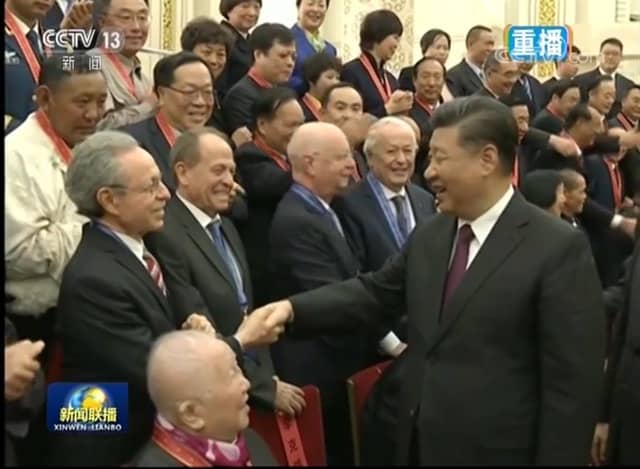
Credit: CCTV/Courtesy of Robert Kuhn
What Kuhn does have, however, is access. In spite of — or perhaps because of — his lack of credentials, Kuhn enjoys a good working relationship with the Chinese Communist Party, and has served as a longtime advisor to China’s top leaders. In addition to his Western media appearances, on the BBC and CNN among others1Kuhn has done extensive interviews on CNN, BBC, CNBC, Bloomberg over the years, especially since 2012 and then even more after 2017 – well over 100, including 60-70 on BBC and CNN alone, he writes regular columns and produces shows for China’s state media, and his 2005 biography of Jiang Zemin, the former president, has been translated and republished in China. He also runs a private consultancy that has helped companies like Saudi Aramco, Daimler, and EMC navigate business in the country. When Disney wanted to deepen its involvement in China, for example, Kuhn set up a meeting between then-chief executive officer Robert Iger and Chinese officials.
In fact, with the possible exception of Henry Kissinger and former Goldman Sachs CEO and Secretary of the Treasury Henry Paulson, arguably no other American citizen has spent more time with China’s top leaders. Kuhn has been a senior advisor to CCTV and Xinhua News Agency and co-invested with government affiliates, including the Chinese Academy of Engineering.2The academy operates under the direction of China’s State Council. He also says he has met eight members of the Politburo Standing Committee over the years, including four separate meetings with Xi Jinping. In 2018, when Kuhn was one of just 10 foreigners — and two Americans3The other American was Maurice “Hank” Greenberg — to be awarded4See his talk just after receiving the medal here the China Reform Friendship Award, President Xi5In 2006, Kuhn helped Xi ahead of a visit to the US, and even arranged for some media and PR through coordination with the Zhejiang government. walked across the room to greet Kuhn and personally thank him for his work on behalf of China.
“There’s nobody like him,” says James McGregor 6McGregor is a former Wall Street Journal reporter, Dow Jones executive, the author of One Billion Customers: Lessons from the Front Lines of Doing Business in China, and now an executive at APCO Worldwide, an American author and businessman with extensive experience in China. “He’s one of a kind.”
But while Kuhn has made an impressive career out of his well-known China connections, his latest PBS film raised eyebrows. Just three days after it premiered, The Daily Caller, a right-wing news website co-founded by Tucker Carlson, published a report entitled, “PBS Stations That Received Millions In Federal Funds Partnered With Chinese Foreign Agent On Pro-Beijing Film.” The article reported that Kuhn did not disclose that the documentary was produced in association with CGTN, China’s state media outlet, or that Kuhn himself has ties to the State Council Information Office, China’s chief propaganda unit. (Kuhn says the credits did disclose CGTN‘s role.)
Six days later, PBS pulled the film, saying that it did not meet “PBS corporate guidelines.” Andrew Russell, PBS SoCal’s CEO, said in a statement that “the specific concern [PBS] had was around the funding and the funding relationship” — not the editorial content itself.
Indeed, the film follows the same formula as most of Kuhn’s documentaries: here’s a problem China is facing, and here’s the government’s solution. Kuhn told me he found it ironic that “the least controversial of my films” — on the “anodyne” subject of poverty — “has attracted the most controversy.”
But while his formula has not changed over the past 20 years, the U.S. and China have.
In addition to Covid-19’s exacerbation of tensions this past spring, Kuhn’s latest work coincided with China’s efforts to present its authoritarian system of government as an appealing alternative to inefficient democracies. And it is against this backdrop, critics say, that Kuhn’s formula amounts to propaganda. Whether the subject is the recent protests in Hong Kong, China’s subjugation of its Muslim minority in Xinjiang, or Beijing’s handling of Covid-19, Kuhn frames the Communist Party’s response as prudent, measured and in service to long-term strategic goals.
Kuhn speaks about his career and China’s reforms and future on CGTN.
“He’s become a chronicler of this regime, and an apparently uncritical one,” McGregor says. “And perhaps that’s helpful because it allows us to understand what the regime thinks of itself.”
Now, after Beijing’s expulsion of American journalists in early 2020, it seems likely that the only foreigners who will have access to China’s regime are those like Kuhn, who insists he’s merely a neutral observer. “I’m often criticized in the West for telling positive stories about China,” Kuhn says of his 20-year career explaining China to the United States. “But I just try to present China’s problems in the overall context of its development and beliefs, and how the leadership is thinking about those things.”
As relations between China and the United States sour, the PBS controversy raises the question: is there still a U.S. audience for Kuhn’s message?
TELLING CHINA’S STORY
Kuhn attributes his midlife conversion to sinology to “the capriciousness of the universe.” Born in 1944 to a working-class Jewish family in New York, Kuhn studied medicine at Johns Hopkins University. By 30, he had married Dora Serviarian, an acclaimed concert pianist, and had three children. He completed a PhD in anatomy and brain science at UCLA and published an influential paper that distinguished human and animal brains. A career as a brilliant scientist seemed guaranteed.
But by his late 30s, Kuhn turned his attention to business. “I was attracted to investment banking for the same reason Willie Sutton robbed banks — because that’s where the money was,” he says, jokingly.7Mr. Kuhn elaborated: Why I went into investment banking was not only or even primarily for the money. I made the Willie Sutton as a self-deprecating joke, which alone, out of context, is a distortion. In fact, I love doing deals, using intellectual and financial skills, and human relations understanding, to create new structures that optimize opportunities. Obviously, money is a motivator, but the creative creations, for me, are the main driver. The Willie Sutton comment, by itself, misrepresents me. He earned an MBA from M.I.T. and spent the 1980s specializing in mergers and acquisitions. Kuhn approached investment banking with the intellectual seriousness of a scientist, and he spent much of his free time writing and editing books about management.
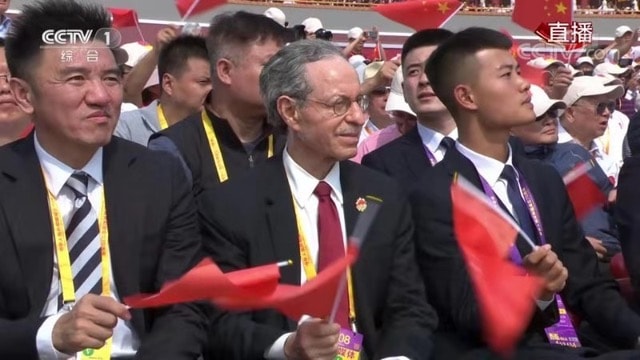
Credit: CCTV/Courtesy of Robert Kuhn
He was 44 years old when he first visited China in January 1989. He accompanied his mentor, George Kozmetsky, a prominent American businessman, to a conference organized by the State Science and Technology Commission on developing commercial applications for China’s scientific research. The subject suited him perfectly, but China was not on his radar. “I had less than an average amount of knowledge of or interest in China,” he says. For him, the highlight of the trip was when he convinced his 23-year-old government translator, Adam Zhu8Adam Zhu worked as a government translator at the time, and he can be seen in the Kuhn timeline image seated on the left and translating for Kozmetsky at a meeting with Zhao Ziyang, to sneak him out of the meetings — “as if I was in a spy novel” — to play ping pong against a prominent member of China’s national team.
When he returned home, Kuhn thought he was done with China, especially when, just five months later, the Chinese government carried out a brutal crackdown of protestors in Tiananmen Square. But in 1990, on a whim, he invited a senior Chinese official, Kong Deyong, to a conference he had organized at UCLA. On the sidelines of one session, Kuhn and other attendees cornered Kong and hectored him about Tiananmen Square. His response changed Kuhn’s life.
“Everything you’re saying about what’s happening to China is true,” Kuhn recalls Kong saying. “It has gone backwards. But frankly, this is more your fault than mine.”
Kuhn was incredulous. “How can it be my fault? I’m not there,” he replied.
“That’s exactly my point,” Kong said. “You’re not there — and neither are the thousands of others like you. And that’s given power to the retrograde conservatives. You’ve abandoned me and all the others who want to see reform.”
“You’re right,” Kuhn said. “I’ll come back.”
Soon, he was traveling from California to China multiple times a year to attend conferences and conduct seminars on mergers and acquisitions. As president of the Geneva Companies, an investment bank specializing in the small and medium-sized firms, these activities mystified his boss. “He used to say, ‘Why don’t you go sightseeing in Italy with me? Why not play golf?’ But neither of those activities interested me in the slightest,” Kuhn recalls.
He reconnected with Adam Zhu9Zhu later worked as an investment banker for Bank of America Merrill Lynch and also as an executive at IMG in China, his minder on that first trip to China in 1989. Zhu had fled to the U.S. after taking part in the Tiananmen Square protests, and after earning an MBA, Kuhn hired him as a junior analyst at Geneva. Unlike other Tiananmen protesters in exile, Zhu did not engage in anti-Chinese government activities in the U.S. and says he later came to see his involvement at Tiananmen as “naive.” “I may not agree with what happened,” he says, “but I now understand why the government did what they did.”
Zhu considered Kuhn a mentor and began accompanying him on trips to China, serving as a translator, aide and eventually business partner. They traveled widely in the country, which was in the throes of rapid modernization. But perceptions of China in the U.S. — shaped by Tiananmen Square and the Cultural Revolution — lagged. Kuhn sensed an opportunity to tell China’s story.
In 2000, when Citigroup acquired the Geneva Companies for a reported $200 million, Kuhn was left wealthy enough to never have to work again. He used the newly-formed Kuhn Foundation to realize a lifelong dream and created Closer to Truth, a public television show in which Kuhn interviewed scientists and philosophers about the mysteries of the cosmos. He also made his first film about China, In Search of China, which was broadcast on PBS.
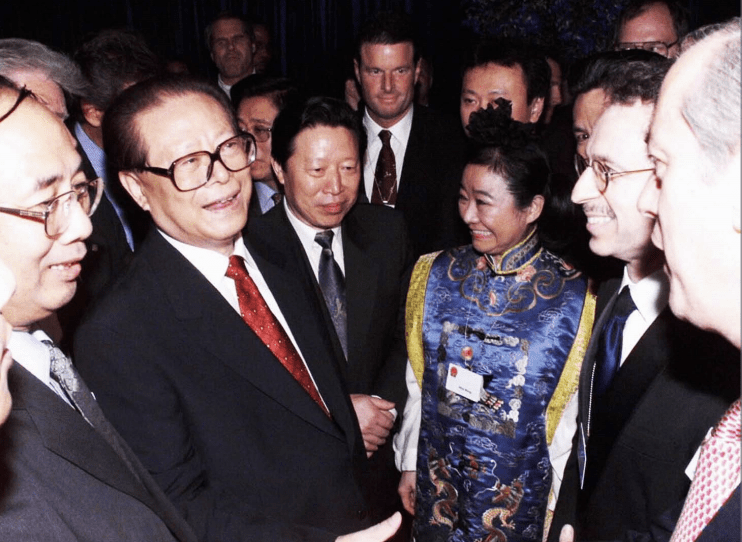
Credit: Courtesy of Robert Kuhn
The turning point, however, came in the early 2000s, when he wrote a biography of Jiang Zemin, China’s jovial leader in the 1990s who had worn business suits and sang “Home on the Range” to American reporters. It was an audacious act: Kuhn had no reporting experience, and no one had ever published a biography of a living Chinese leader. But he employed teams of researchers who sifted through primary source documents about Jiang’s early years in pre-revolutionary China, as well as his days as a young Communist official in the early Mao period. Eventually, Chinese officials came to trust Kuhn. “They could tell that I wasn’t going to write a hatchet job,” he says.
Kuhn eventually secured cooperation from Jiang himself. The president, approaching 80, had stepped aside, making way for the dour, humorless Hu Jintao. But Jiang still wielded significant influence over the Politburo and the nation. Kuhn says Jiang once invited him to a dinner in Beijing with his inner circle, in the country’s leadership compound, Zhongnanhai.10Much substance was discussed – most of which appears in the biography. A couple of years later, Jiang hosted a private dinner for my family (wife and daughter) with close associates in Beijing, after the biography was published, when my wife was performing as piano soloist with the China Philharmonic Orchestra (2005) Immediately, to put Kuhn at ease, Jiang insisted that everyone speak English. The conversation flowed amiably until Jiang turned to Kuhn and asked him what Americans thought about the North Korean nuclear situation.
Kuhn pointed to the other people in the room. “These people here may all be intelligent and well-respected, but they all work for you,” he said. “So they’re not going to tell you the truth. But I will. And the truth is — Americans think the North Korea problem is your fault.”
The room fell completely silent. Jiang turned to Kuhn and exclaimed, “That’s what George Bush said to me! I told President Bush, Kim Jong Il won’t even take my calls!”
When the book was finished, Kuhn navigated China’s byzantine censorship system for a Chinese translation. He asked for — and received — assurances the Chinese translators would not change a single word he wrote. But he allowed them to remove content they found objectionable, including 14 pages about the Tiananmen Square massacre. “This, to me, was acceptable,” Kuhn says.
The Man Who Changed China uses Jiang’s life to tell the story of modern China, but, curiously given the claim of its title, the book presents Jiang as a man swept up in the currents of Chinese history rather than an active participant in it. Writing in Foreign Affairs in 2005, the scholar Bruce Gilley, who earlier had written his own book about Jiang, argued that Kuhn’s biography “reflects the preoccupations and worldview of its subject” and the image that “Jiang and China’s new leaders want their people to see.”11Kuhn responded to Gilley here.
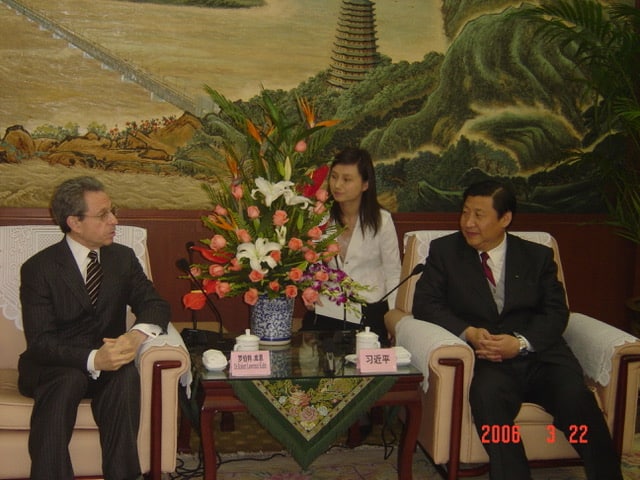
Credit: Courtesy of Robert Kuhn
The book didn’t receive much acclaim in the West, but in China Kuhn did a promotional tour in provincial-level cities, which brought him into contact with a number of officials. One in particular stood out. He radiated a quiet confidence, Kuhn remembers, that other, more boastful cadres, lacked. Upon meeting Kuhn, he grasped the book and flipped immediately to a photograph of three women in the middle. “See her?” he said, pointing to one, a famous singer with the People’s Liberation Army. “That’s my wife.”
Kuhn beamed. The official had clearly read his book. His name was Xi Jinping.
THE LOGIC OF INTERDEPENDENCE
In the 15 years since his book’s publication, Kuhn has regularly deflected accusations that he is a propagandist for the Chinese government. Instead, Kuhn says, he has spent the past few decades “helping the world understand China and China understand the world” — efforts he hopes are in the best interest of the U.S. and China.12Kuhn statement to The Wire: I love to learn and communicate. Originally I went to China to understand a rich culture and novel political system with ambition. Over time, I sensed that I could contribute (in my small way): helping the world understand China and China understand the world. I wrote the first investment banking book published on the mainland (1996). I began advising multinational corporations on what I call a “politico-strategic framework” for doing business in China. In recent years, as tensions between China and the US/West have escalated, I’ve sought to convey the motivations and thought processes of Chinese leaders, especially those of President Xi Jinping. I am more often in the Chinese media, where I offer distinct views not voiced publicly by others. While some in the US criticize me for being too soft or too accommodating, some in China criticize me for inculcating Western ideas (a Chinese phrase leveled against me: “low-level red, high-level black”). Both criticisms, which I appreciate, I reject. I try to work in the best interests of both the US and China — an increasingly daunting task — which, for American audiences, means to understand what is really happening in China, including how Chinese leaders think; and for Chinese audiences, including leaders/officials, means to understand why American audiences react so negatively to China’s policies and behaviors. Bottom line: I want to help China.
Although he has close ties to Party leaders, Kuhn says he has never been a full-time resident of China, sought citizenship in the country, or professed fealty to the Chinese Communist Party. The government only reimbursed him for travel expenses once, in 1990. Then, beginning in 2015, he says the government began paying him regularly to co-produce, host and work on his CGTN series, “Closer to China.”
He has also done business with the state. As early as 1999, he began investing with his new allies in Beijing, according to WireScreen,13The Wire has a data division called WireScreen that tracks Chinese corporations. For more information please email us at contact@thewirechina.com this publication’s data platform. He set up a joint venture with the country’s propaganda newspaper, People’s Daily, to produce Global People, a magazine. He also invested14Kuhn also served as vice-chairman of the company in the Beijing-based China Technology Innovation Corp., with several Communist Party affiliates, including the Chinese Academy of Engineering (which is under the State Council), as well as Peking University and Tsinghua University. 15(China Technology Innovation Corp. was part of the government’s “Torch” program, a bold government effort to develop advanced technologies.) With another Chinese partner, Kuhn also established Pacvia Communications, a Los Angeles-based media company that “produces television series for CCTV [China Central Television] and syndication in China and distributes Chinese-related programming in the U.S.” (Kuhn says he sold his interest in the company in 2005.)
Kuhn says he didn’t make a bundle in the deals, and that his primary role — which he plays “better than anyone” — is relaying what and how Chinese leaders think.
“Robert doesn’t support many of the things that the Chinese government is doing,” says Zhu, who still works with Kuhn. “But because we have unique access to the people making these decisions, we have a view of why they’re doing what they’re doing.”
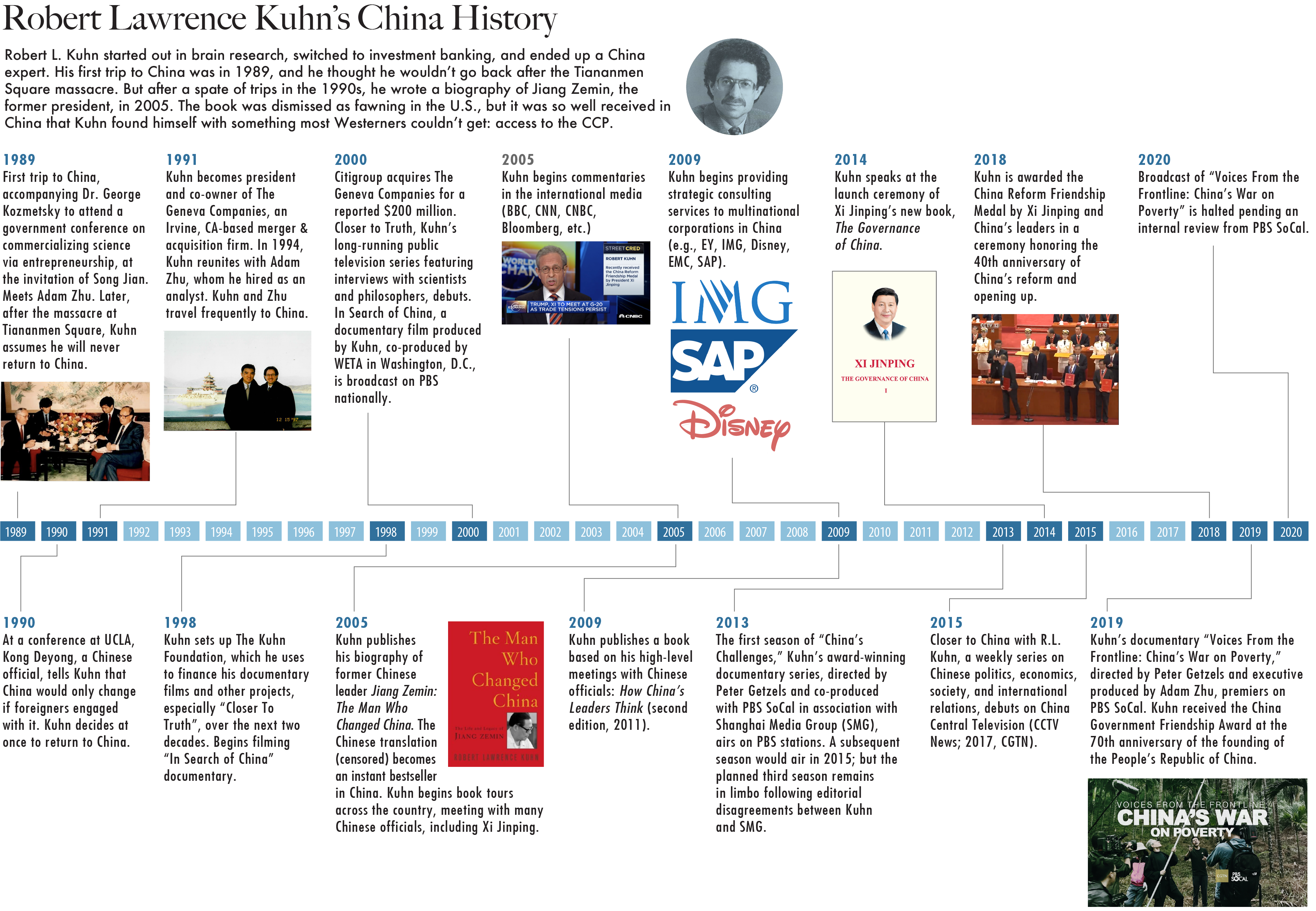
In June, when Beijing announced the new national security law for Hong Kong, for example, Kuhn used his platform at CGTN to explain the move as part of China’s long term strategic goals. “The central government wants to expand Hong Kong, not constrain it, especially as core of the greater Bay Area development plan to build a world-class mega-region,” he said. “Accordingly, the central government will defer to Hong Kong as much as possible and as long as possible — but there are three red lines that cannot be crossed: movement toward Hong Kong independence, using Hong Kong to undermine the mainland’s Party-led political system and unending chaos such that Hong Kong’s economic viability would be threatened.”
It’s not clear what Kuhn’s private views are, but some of his public comments move beyond mere explanation to unambiguous support for the Chinese Communist Party. In February, for example, when the Chinese government faced sustained international criticism for allowing Covid-19 to spread beyond its borders, Kuhn noted that the culprits were misguided local officials — not China’s political system. Writing in the South China Morning Post, Kuhn praised China’s “commitment, competence, and willingness to change and grow,” and asserted that “history may well thank China for pioneering how to deal with virulent contagions in a globalized world.”
Claire Chu, a senior analyst at the RWR Advisory group, a Washington, D.C.-based consultancy, says such pronouncements are a valuable tool for Beijing: “It allows the Chinese government to have this extra layer of credibility to a lot of their views because it’s coming from a Westerner.”
For his U.S. audience, Kuhn maintains that his films depict conflict in China in ways that do not flatter the country, such as the still-persistent problem of rural poverty. But critics point out that Xi himself has identified the issue of poverty as central to China’s current mythology — that it is a developing country that has yet to fully mature. “For a foreigner to pick the topic that the Chinese leader has identified as important — that’s selective pandering,” says David Shambaugh, an authority on China who teaches at George Washington University. “Kuhn wouldn’t get access to what he needed in China if it weren’t a topic that the government wanted to be broadcast.”
Kuhn wouldn’t get access to what he needed in China if it weren’t a topic that the government wanted to be broadcast.
David Shambaugh, China expert and professor of political science and international affairs at George Washington University
These days, however, as China’s desire to accommodate the West has diminished, nearly every foreigner seeking access to China has to make compromises, analysts say. For journalists, businesses, and media trying to operate within China, some degree of acquiescence is inescapable. Even Kuhn has noticed — and bristled — at the ideological shift. A third season of his documentary series, China’s Challenges, for PBS has been stalled after Kuhn refused to implement cuts requested by the Shanghai Media Group16a state-owned media company. It is a development that Kuhn describes as an “extreme disappointment.”
Despite the recent changes in China’s environment, however, Kuhn doesn’t regret his involvement with the state media, which he justifies as similar to any business operating in China today.
“Unless you’re working in an orphanage or in some other purely charitable activity, there’s no difference, in my view, between working with CGTN and selling any other product in China,” he says. “I may have a higher obligation to say what I believe, because I’m not, say, selling iPhones or diapers. But everything I say I genuinely believe. It just may not be the totality of what I believe.”
In the end, then, the question about Robert L. Kuhn may not be whether he’s holding his nose or not when he relays China’s message. It’s if his decision to engage with China in pursuit of his own interests reflects a bygone era or the road ahead. At the same time Kuhn was having his China awakening, successive American presidents pursued a policy of engagement with China based on the logic that economic interdependence and increased exchanges between the two populations would bring them closer together. By doing whatever he needs to to ensure those exchanges, it could be argued, Kuhn is holding onto some version of that.
But rather than adhering to America’s aspirations for it, China has instead moved in the opposite direction. Since 2016, Communist Party officials in Xinjiang, the country’s far-western region, have detained more than one million Muslim ethnic minorities in euphemistically-named “re-education facilities,” forced hundreds of thousands of others to billet with Han Chinese minders, and subjected the population to the world’s most extreme forms of digital surveillance. When I ask Kuhn how he reconciles his disgust with Tiananmen Square with what is happening in Xinjiang, he offers his own logic of interdependence.
“When Tiananmen Square happened, I’d made only one trip to China and had no activities there. So it wasn’t like I was giving up anything,” he says. “But now, with all I’ve done with China, when Xinjiang comes up, would it rise to the level where I’d reconsider my whole relationship? No, I just don’t. Does that mean that I am a weak moral person? Someone else can make that judgment.”
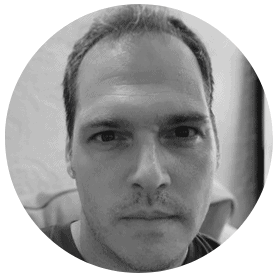
Matt Schiavenza is assistant director of content at Asia Society and senior editor of Asia Society Magazine. His work has been published in The Atlantic, The New Republic, The Daily Beast, Fortune, The Los Angeles Review of Books, and many other publications. He is based in New York City.


